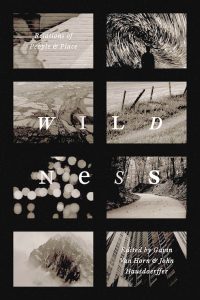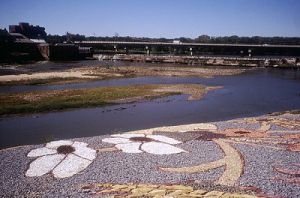I live within a mile of the Kansas River. In spite of the Bowersock Dam and other infrastructure, this is a good place to connect with wildness. Walking on the levee beside the river offers a chance to watch birds soaring and fishing—great blue herons are frequently present at the river, and in winter bald eagles too.
Frequently people are making use of the water via kayak, canoe, or fishing boat. In spite of the nearby development, the river is a relatively wild place. At the other side of the broad continuum of local wild spaces are the richly-diverse Haskell-Baker Wetlands and also the expansive Clinton Lake Wildlife Area, yet there is value in every degree of wilderness.
My reflections are inspired from reading the book Wildness: Relations of People and Place, opens a new window. This new anthology includes creative and provocative essays, stories and poetry—it represents diverse understandings of our natural world by many highly regarded writers. 
I was driven to the book Wildness when I read a review by author J. Drew Lanham. I reviewed Lanham’s book earlier; The Home Place: Memoirs of A Colored Man’s Love Affair With Nature, opens a new window is a book of elegantly-written prose connecting his commitment to land ethics with social justice with a great deal of inspired optimism.
Lanham wrote this about the book Wildness:
This amazing amalgam goes at the issue of nature, wildness, and our relationships to it via personal story, lyrical verse, and reflection. It is storytelling and word-singing at its best…and a book I simply want on my bookshelf to pull down and read words that flow like water but have the lasting impact of fire.
The book is filled with deep, thoughtful explorations of human connections to the idea of wildness. Each writer shares their response to these questions:
What defines our ecology, and how are the natural and the human communities interdependent? What keeps the whole community in harmony and helps it sustain and thrive? —In other words, what is the process of persistent wildness?
Wildness was created by the Center for Humans and Nature, an organization associated with the University of Chicago. Their website, www.humansandnature.org, opens a new window, is an interactive forum of socially and ecologically focused tools to advocate, reach out, and explore. Here is how they describe their organization:
The Center for Humans and Nature partners with some of the brightest minds to explore human responsibilities to each other and the more-than-human world. We bring together philosophers, ecologists, artists, political scientists, anthropologists, poets and economists, among others, to think creatively about a resilient future for the whole community of life.
Several short videos related to the essays in Wildness are highlighted on their website at www.humansandnature.org/wildness, opens a new window. Each video features an author from the book and adds depth to the themes of environmental and social justice. One of the most compelling of these videos is presented by Mistinguette Smith.
She discusses African American understandings of wildness and her work with the Black / Land Project—a community garden in Cleveland. Wildness and relationships to land are defined differently, based on cultural experiences and historical injustices. For Smith, wild connections are made in a community garden where you can grow your own food.
By exploring the book Wildness, I have reinforced my resolve to connect environmental and social justice. And I am compelled to echo the message in my review of J. Drew Lanham’s book, The Home Place. I hope you will also be inspired to reach out to be more inclusive—to engage more kids and adults from diverse communities to explore and connect with relatively wild places. I am envisioning exponentially greater advocates for our community’s wildness!
It seems appropriate to note, in relation to eco-justice, recommended assistance to survivors of Hurricane Harvey may start with the helpful resources at the Center for Disaster Philanthropy, disasterphilanthropy.org, opens a new window.
-Shirley Braunlich is a Readers’ Services Assistant at Lawrence Public Library.
Cover photo credit: John Charlton of Kansas Geological Survey




Add a comment to: Relatively Wild—Inspired Intersections of Ecological & Social Justice